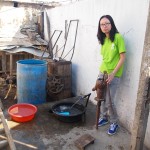人道救援, 非洲2015年2月27日
Ebola update: We can't stop now
李宝琪
李宝琪于2013年加入乐施会,现为人道救援及灾害风险管理高级干事,她在工作中接触到许多紧急救援的情况,给她留下最深刻印象的是人民在应对灾害时表现的力量。

Oxfam Community Support Workers teach children in West Point, Monrovia (Liberia) how important it is to wash their hands to prevent the contraction of Ebola. | Abbie Trayler-Smith / Oxfam
When I brought my niece to drawing class last Saturday, I was requested to pay HK$2 to buy a face mask for her because we forgot to bring one. Upon arriving at the centre, she, like the other children, had her temperature taken and had to wash her hands before entering the classroom. With the government’s Preparedness Plan for Influenza Pandemic setting its response level at ‘serious’, it’s unsurprising that these measures are in place. In fact, they show how important changing people’s behaviours is in reducing transmissions.
These kinds of simple preventative measures have also been used in Guinea to minimise the risk of Ebola transmissions when more than 1.3 million children returned to school in January this year. Due to the Ebola outbreak, schools in the three most affected countries (Liberia, Guinea and Sierra Leone) did not reopen after the end of the July-August holidays, depriving five million children of months of education. Putting these measures in place has allowed Guinea to reopen its schools on 19 January, Liberia on 16 February and Sierra Leone at the end of March.
As three of the world’s poorest countries, it’s going to be difficult for Liberia, Guinea and Sierra Leone to recover from this epidemic. In fact, these countries are at risk of becoming even poorer with the outbreak of Ebola. That’s why Oxfam is working to help eradicate it. We’ve reached over 1.1 million people in Liberia and Sierra Leone so far through supporting medical facilities and by working with communities to prevent further infections and ensuring people seek treatment.
Although the situation is, thankfully, getting better, there’s still much work to be done. For Ebola survivors like Stephen, for instance, work is hard to find and making a living is incredibly tough. Needless to say, it’s even harder for him as he’s lost many of his family members and is taking care of 13 orphaned children.
To prevent more cases like Stephen’s from occurring, we are continuing our emergency response while stepping up our efforts in helping communities recover. We are actively looking for cases of Ebola to treat them as early as possible and thus increase their chances of survival. Cash assistance programmes have also been put in place for quarantined homes to prevent people from going hungry. Moreover, we’re investing in jobs and strengthening essential services, such as health care, education, water and sanitation.
Though media coverage is beginning to diminish, our efforts cannot end here. There is hope that we can all end the epidemic this year, but we must proactively take steps to do so. Put at a double disadvantage, it’s even more crucial that we put an end to the epidemic in Sierra Leone, Guinea and Liberia, and get these countries back on their feet.
Kate Lee is a Humanitarian and Disaster Risk Management Programme Officer at Oxfam Hong Kong

